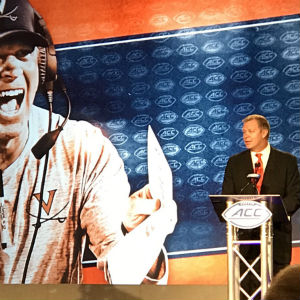UVA football coach Bronco Mendenhall and players Kurt Benkert and Quin Blanding talk with reporters at the 2017 ACC Kickoff.

The two players that I’ve brought with me today I think are great representatives of our program. We’re all together now for year number two: Realistic, optimistic, and anxious to get to work. And really that’s the only promise we’ll make is that we’ll put in the amount of work necessary to continue to grow and build the program.
I’m very impressed with the ACC after being in the league one year, the quality of coaches I’m impressed with, the depth of the league I’m impressed with, the postseason record I’m impressed with, and certainly having the National Champion and Heisman Trophy winner.
Honored to be part of what I consider the best league in college football to this point. Certainly I hope that Virginia will be able to contribute and battle our way to the top of that league, and look forward to taking on that challenge.
With that…
Q. Just what you can say about why returning to Virginia was the right decision for you and why at this point in your collegiate career you felt like it was good for you to come back and be a part of what Bronco is trying to build here.
QUIN BLANDING: First I want to start off by saying it’s an honor to be here. It’s just always been a dream to be here. But to come back is just — I believe in the system. I trust the system. I trust the process. You know, why not go one more year and go out with a bang and increase the status of Virginia, and just like I said, go out with a bang.
Q. What did you learn about Coach Mendenhall, his personality, his system last year? How does it make you better prepared for this year?
QUIN BLANDING: Starting off with his personality, he’s a great guy. You don’t know what you’re going to get with Coach Mendenhall. He’s so up front and so straightforward that most people won’t really understand what he’s saying until you actually see it or see him do it. So like our training right now, you wouldn’t believe if I told you what we do at training right now. You wouldn’t believe in it until you see it or you actually go through it. His personality stands for itself. He’s calm. He’s passionate, and he loves the kids.
I learn a lot from him. He teaches us a lot about science and how it relates to our life with a different message every morning, so he’s a great guy.
Q. There was a massive loss of offensive talent from this conference to the NFL Draft, but there’s 18 Bednarik Award watch list members in this conference, the most of any. You’re among those, as well as Micah. Do you feel like the ACC is shifting into a more defensive conference, and is that advantageous for a team like UVA?
QUIN BLANDING: Yesterday I put a tweet out saying, it’s ACC. That’s the bottom line. A lot of people don’t give credit to the ACC. We’re offense and defense-wise. I know we have a lot of people coming back on the defensive side, but the ACC is where it’s at, and I wouldn’t want to be in another conference.
Q. Your coach said optimistic and realistic, so what are the realistic goals for a team like Virginia that like Syracuse is trying to work its way up?
QUIN BLANDING: Take every week one day at a time. Take each practice, take each game, and that’s our bottom line, and that’s our bottom goal. Go in each week taking one week at a time, and you’ll see the end results.
Q. You’re kind of an elder statesman on this team now. Will you become more vocal? Will anything change in that regard this season?
QUIN BLANDING: Nothing will change. I’m the leader of the defense. I make the calls, and I see everything before anyone sees anything anyway, so I’ve got to know what the offense is going to give me. I’ve got to be in their huddle before they even come out of the huddle. So that’s been my job since my second year and that’s job I`m going to keep continuing. I`m just going to keep growing at it.
Q. Same question I asked Quin: Realistically for your program, for your team, what kind of goals can you guys set as far as trying to win the division or just trying to improve on last year?
KURT BENKERT: I think Quin really hit on it. For us it’s really important to take it one day at a time and take it one game at a time, and as long as we’re making improvements and the improvements start compounding as the season goes on, we feel like we’ll see pretty good results. So we’re just focusing on one day at a time and we still have training on Monday, so we’re really not trying to get too far ahead of ourselves.
Q. Just what you can say about last year playing through injury and playing through that adversity, what it taught you, and ultimately how it strengthened you to be where you are right now.
KURT BENKERT: I think playing through that difficulty really kind of showed me who I was and what I could take as a player and kind of helped push me to my limits. I’m really looking forward to playing and starting the season healthy and getting through it that way. It was something that was difficult, but I got through it, and I was really happy I was able to do that.
Q. Obviously you’re entering your second year as quarterback; how much more open is the offense, and you obviously are not coming off the injury this year. How much more mobile are you, and will we see you maybe used in a more mobile way coming in the season?
KURT BENKERT: Yeah, so being out of surgery for my knee about two years now has been really good for me, just being able to get the explosiveness back as far as running goes. But what was the beginning part of your question?
Q. How much more open is the offense now in your second year?
KURT BENKERT: Yes. I would say across the board, just having a more increased understanding through the receivers, the offensive line, not really just being on the basic level of understanding what Coach Anae is trying to have us do and understanding the whole concept and how the defense is going to try to stop each play. I think we’re really growing and getting to that point and not just at a basic level like we were last year.
Q. Does it help to know that there isn’t really a quarterback competition per se this year, that you can kind of come in with no pressure on that and just play the game?
KURT BENKERT: I wouldn’t say that it helps. I think competition brings the best out of everyone, and I’ve been competing since I’ve been in college, so this will be the first year it’s not a true competition. But every day is really a competition regardless, so it doesn’t matter who’s behind me or who would have been in front of me. I treat everything the same. It’s always a competition for me.
Q. You’ve had a full year in the system now. How much better do you feel going into fall camp this year as compared to last year?
KURT BENKERT: It’s light years ahead of where we were last year. Spring was really big for us, but I think the biggest part is just understanding who’s in the offense, who I’m throwing the ball to, who’s in front of me, what the running backs can do, and just really understanding personnel, and that just takes time and it takes a lot of extra time outside of the two hours here and there that we’re required to be there. There’s been a lot of extra work put in behind the scenes, so we’re looking forward to it paying off.
Q. Similar question to what I asked your players. You’re trying to change a culture there for a program that’s, I think, won 29 games in seven years. How difficult is that, and how do you approach that challenge?
BRONCO MENDENHALL: First of all, it was an intentional choice on my part in choosing to leave Brigham Young. I was looking for — my passion is building, and my passion is doing hard things and building people, and so invigorating is the word that I use. Every single day there’s a brand new challenge and something that can be improved. I think there’s nothing that brings me more fulfillment, and so I’m working as hard as I can every single day with players that I love and are starting to grasp what that’s going to take in year two, and that’s fulfilling.
There is no time frame that I’m imposing, as you heard the players talk about. We’re maximizing every single day in the program that we think is family first, last and always by doing really hard things together. And I feel really close to these kids, our team, and that in and of itself has been rewarding beyond belief, that they’re willing to take this on, want to take it on, and we feel unified to do it.
So gratifying, invigorating, challenging all at the same time, but that’s what I was ready for in my coaching career at this stage. And so I’m getting exactly what I wanted and what I chose.
Q. I’ve asked you about this before, but to go a little bit deeper into just the day-to-day with Ruffin McNeill and what he is leadership-wise, what he is on and off the field, and you said family first, last and always; just how he embodies that, as well.
BRONCO MENDENHALL: Well, Coach Ruff, it was certainly bittersweet seeing him move on to Oklahoma. Coach Ruff is one of the best people I’ve ever met in or out of football, just bottom line. He’s genuine. He’s authentic. He had a saying that he would coach you hard and love you harder, and he had a unique ability to switch. He has a unique ability to switch from one to the other seamlessly, and the players grasp that, and they would take hard coaching from him because they knew of his intent and his motive.
In every team meeting a year ago, we had what we called Ruff Time, where I’d give him a chance to stand in front of the team, and none of us ever knew what was going to be said, but I had complete trust that it would be powerful and impactful to the development of young people. I cherish that year I had with him and will miss he and Arlene both. But he’s earned the chance through his career to make those choices and to do whatever he thinks will be fulfilling to him and take on a new challenge.
I think part of his thought process in going to Oklahoma is the new head coach there is someone that he’s mentored, and I think — I smile as I think now about a first-time head coach with Ruff standing beside him to kind of nudge him here or direct him there or maybe kick him a little bit, and I think that’ll be a huge asset to their program.
Q. One of the things that stood out to me about you particularly last year was your ability to — whether it was a win or a loss, to pick the good out of every player’s performance and make note of that in the conferences. Talk about yourself for a moment if you could; how would you say you did last year personally in laying the foundation down for this UVA squad, and what sort of blocks are you looking to build here in 2017 as far as you personally amongst yourself and your coaches?
BRONCO MENDENHALL: I appreciate the question. I believe in simple successes, and I think by small and simple things, great things are brought to pass. And so as simple as seeing our team warm up correctly, I would relish that and cherish it. When I see a player finish through a line as hard as he can go, when I see a player — we actually film our sideline, what I call our fourth side of the ball — if I saw our fourth side of the ball in a game react in a manner that looked authentic and genuine and supportive of what was happening for our team, those are all things that I pass on to our team.
I think great things are built very simply, very methodically and really detail-oriented. And so as it has been yet to show in terms of wins and losses, and I don’t know when that’ll happen, I’m certainly not going to let the small improvements that I see that are leading to that go without acknowledging those.
I crave those simple successes, as do our players.
Now, in terms of how I handled it personally, wow. Utah and Virginia, there’s a long ways in between those states, and 14 families came across the country, 53 little kids, so I feel a huge responsibility to the family members of our staff that have come. My wife and I have done everything we can to just make this an amazing adventure, as what we promised our own children, that this would be an amazing adventure. But I do have to be brutal and honest from the standpoint of I’m not used to losing more than winning, and that was a reframing, so to speak. And quite frankly, I think if you’re not careful in the sport, you can be defined only by winning and losing.
So that was a unique challenge to have that reframed after 11 years of winning football, to then kind of now experience the other side of that and ask some questions. What impact does that really have on me and wrestle with that and then come out the other side to make sure I can do the very best to continue to lead and guide the kids and young men and show an example of what grit and determination and resolve and consistency looks like.
Wow. For no other reason, I’ve benefitted in that regard in terms of self-discovery.
Q. Going into your second fall camp, what’s the biggest difference this year as compared to last year?
BRONCO MENDENHALL: At the University of Virginia, what I’ve learned through Thomas Jefferson’s approach is it’s not a freshman or a sophomore or a junior or a senior, it’s a first year, second year, third year, fourth year. My entire team were first years last year. Even Quin, who has all kinds of ACC experience and is a very good player, that was his first year in our system. It’s been fun to see confidence, maturity, decisionmaking, and execution improve with more of a focus actually on playing the game than some of the things that just enable us to play the game.
And so most of our work has moved, and I think work is categorized — most of our work is moved from competitive-enabling work or business-essential work to our competitive work. And so what’s really happened is more time is being spent, and we can spend more time because the team is more prepared to focus on the actual game itself. Knowing that I’m the type of coach that won’t allow that to happen unless the other things are being handled the right way and at a level I’m comfortable with, I’m looking to build a program of consistency and sustainability with no shortcuts.
Sometimes that was at the expense of our competitive work, but again, I’m looking for something that will be sustainable and the foundation won’t skip any steps. More of our work to this point in year two has now been competitive work than competitive-enabling or just business-essential and trying to get those things right. And it’s been noticeable, and as you already heard the players say, it’s because I don’t really allow them to move more than one day ahead. Each day has to be a masterpiece before we move on, or we repeat the last day.
Q. Kurt was up here just a few minutes ago and just what you can say about at quarterback what he’s meant to this team, seeing him go through that adversity of playing injured last year and how he’s leading you into the second year. I know you said you don’t know when the wins will come, but what you can say about his leadership and what he’s brought to the program.
BRONCO MENDENHALL: First of all, what Kurt is bringing to our program is ability. When I first saw him, even though he had his knee brace on and he came in for fall camp, instantly there was a presence and the ability to make every throw. Those are the two things I noticed first. What was also clear at that time is his mobility was not back, and his understanding in a brand new system was going to take time. So all those things were apparent at the beginning.
What we held pretty close to the vest a year ago is the hit he took in the UConn game, which was early in the year, had a significant impact on what we could do with him and what we did do with him and what we chose to do with him. And I think he handled that really, really well, fighting through a lot of adversity.
What I see at this point — and I’m now taking and moving back to spring practice — he’s more mobile, he’s more accurate, he’s more confident, he’s certainly healthier, and will need to remain so for us to continue to move the program forward, at least in year two the way we would hope. He’s critical to that. And so that’s a unique challenge now as the head coach is to design systems to make sure he can remain healthy, confident, and capable in practice and in the games but still have the aggressive edge in terms of play calling and utilizing him that allow us to have the advantage we need competitively.
Q. One of the things you talked about this past spring was the understanding of the personnel more so this year than last year. How much more have you developed an understanding of this personnel, and specifically offensively, guys like Olamide or Andre Levrone. How big of an impact do you expect them to make with a better understanding with them in the system?
BRONCO MENDENHALL: Yeah, I think that’s a great question, and glad that you gave me a chance to talk about it. Our particular approach now, again, as we’re developing a program, and our intent in year one was really to establish systems as much as we could and the way that we’re going to play those systems, and I’d love to say that we could at the same time a year ago focus more on using each player in the right spot at the right time with the right capabilities.
What is shifting — not shifted yet but shifting, is the ability to know what each player on our team can do, make sure they’re on the field at the right time doing the right thing to deliver the results, and so we’re much more personnel-specific than we were a year ago, which was more general in expectations and demand, where now it’s becoming to the point where each player, even if it’s at the expense of slowing our tempo or taking a little more time or being a little bit more deliberate, is with our current roster and where we are, using the right players at the right times, doing the things they can do at a higher level. I think you’ll see a shift in that direction in relation to your question.
Q. Yesterday the conversation with Coach Babers was about the second year, fourth game, how it just seemed to make sense at that point. Coach Babers really couldn’t put his finger on why. Do you take on that same philosophy that by the fourth game in your second year that maybe it really does all start to come together?
BRONCO MENDENHALL: I haven’t narrowed it down to that specific of a date, nor do I necessarily agree with it, but what I do think is there will come a time for every program and every new coach that has a real impact on his players where there is a moment where you recognize it, but I don’t think that moment defines it. I think all it does is manifest all the work that kind of comes through, and it appears to be a breakthrough, but that’s the — maybe the culmination of all these small and simple things. And when that happens, I’m not sure I could define it and say or agree with that date, other than for all of us that are taking on new programs, I think we relish the chance where we can from the sideline in practice or a game say where this is going to be good. I think that’s what any great teacher and anyone that cares about young people, that’s what we want.










